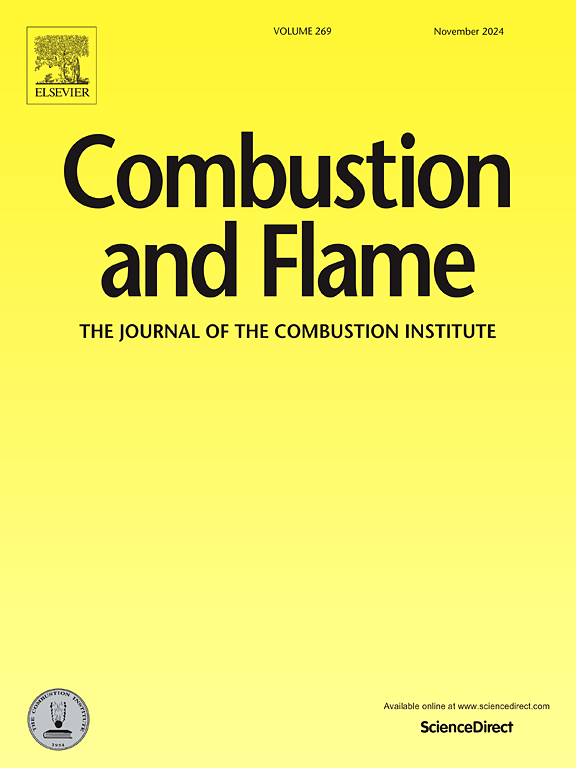关于氢气/空气和氢气/氨气/空气混合物在减压和常压下流动促进点火的实验研究,涉及氢气/空气和氢气/氨气/空气混合物的小路易斯数、近统一路易斯数和大路易斯数
IF 5.8
2区 工程技术
Q2 ENERGY & FUELS
引用次数: 0
摘要
在足够小的火花间隙(dgap=0.64 mm)和亚大气压(p = 0.3 atm)条件下,Chen 等人(2023 年)的数值模拟报告了在垂直于一对电极的强加均匀流中的流动促进点火(FFI)现象。24 mJ)无法点燃等效比 ϕ=0.4 且路易斯数 Le≈0.43<<1 较小的静态氢气/空气混合物,但在流动条件下点火成功。这意味着发生 FFI 的主要原因是热损失,而与 Le 无关,这与之前的湍流促进点火结果相矛盾。为了测试 FFI,在 dgap=0.6 mm 的条件下,使用相同的模拟流-电极概念,通过一个位于大型压力控制室中的均匀流装置,对三种目标混合物进行了良好的点火实验,这些混合物的 Le≈0.43<<1(H2/空气,j=0.4)、Le≈2.3>>1(H2/空气,j=5.1)和 Le≈0.95∼1((80%NH3+20%H2)/空气,j=1)。在 p = 0.3 atm 和/或 1 atm 的静态和流动条件下,以入口流速(Uin=0-10 m/s)测量 50%可燃性时的最小点火能量(MIE),各种 Eig=0.2∼250 mJ 的精度都很高。实验结果表明,即使在 p = 0.3 atm 的条件下,Le≈0.43<<1 和 Le≈0.95∼1 的情况下也不会出现 FFI,因为 MIE 值会随着 Uin 的增加而逐渐增大。然而,Le≈2.3>>1 情况下确实发生了 FFI,因为 Eig=250 mJ 无法在 p=1 atm 时点燃静态混合物,MIE 从 Uin=1 m/s 时的 151.8 mJ 急剧下降到 Uin=4 m/s 时的 30.1 mJ。这些结果提供了均匀流动对预混合火焰电火花(强制)点火影响的重要信息,揭示了两个关键点:(i) 仅热损失不会导致 FFI,因为即使在 p = 0.3 atm 时,FFI 也不会在 Le∼1 和 Le<<1 情况下发生。(ii) 只有在 Le>>1 足够大和 dgap 足够小的情况下,才会出现 FFI。本文章由计算机程序翻译,如有差异,请以英文原文为准。
An experimental investigation on a flow-facilitated ignition at reduced and normal pressures for small, near-unity and large Lewis number of hydrogen/air and hydrogen/ammonia/air mixtures
At sufficiently small spark gap (dgap=0.64 mm) and at sub-atmospheric pressure (p = 0.3 atm), a numerical simulation by Chen et al. (2023) reported a flow-facilitated ignition (FFI) phenomenon in an imposed uniform flow perpendicular to a pair of electrodes, where a constant ignition energy (Eig=1.24 mJ) cannot ignite the hydrogen/air mixture at an equivalence ratio ϕ=0.4 with small Lewis number Le≈0.43<<1 in quiescence but ignition is successful in flowing conditions. This implied that the occurrence of FFI was mainly due to heat losses regardless of Le in contradiction with previous turbulence-facilitated ignition results. To test FFI, a well-controlled ignition experiment at dgap=0.6 mm using the same simulation flow-electrode concept via a uniform flow setup resided in a large pressure-controlled chamber with optical access is conducted for three targeted mixtures having Le≈0.43<<1 (H2/air at ϕ=0.4), Le≈2.3>>1 (H2/air at ϕ=5.1), and Le≈0.95∼1 ((80%NH3+20%H2)/air at ϕ=1). Various Eig=0.2∼250 mJ of high accuracy are applied to measure minimum ignition energies (MIE) at 50% ignitability under static and flowing conditions with an inlet flow velocity (Uin=0–10 m/s) at p = 0.3 atm and/or 1 atm. Experimental results show no FFI for Le≈0.43<<1 and Le≈0.95∼1 cases even at p = 0.3 atm, because values of MIE increase gradually with increasing Uin. However, FFI does occur for Le≈2.3>>1 case, since Eig=250 mJ cannot ignite static mixture at p = 1 atm and MIE decreases drastically from 151.8 mJ at Uin=1 m/s to 30.1 mJ at Uin=4 m/s. These results provide important information of the effects of uniform flow on electrode-spark (forced) ignition of premixed flames, revealing two key points: (i) Heat losses alone cannot lead to FFI, because FFI does not occur at Le∼1 and Le<<1 cases even at p = 0.3 atm. (ii) FFI only occurs at sufficiently large Le>>1 and sufficiently small dgap.
求助全文
通过发布文献求助,成功后即可免费获取论文全文。
去求助
来源期刊

Combustion and Flame
工程技术-工程:化工
CiteScore
9.50
自引率
20.50%
发文量
631
审稿时长
3.8 months
期刊介绍:
The mission of the journal is to publish high quality work from experimental, theoretical, and computational investigations on the fundamentals of combustion phenomena and closely allied matters. While submissions in all pertinent areas are welcomed, past and recent focus of the journal has been on:
Development and validation of reaction kinetics, reduction of reaction mechanisms and modeling of combustion systems, including:
Conventional, alternative and surrogate fuels;
Pollutants;
Particulate and aerosol formation and abatement;
Heterogeneous processes.
Experimental, theoretical, and computational studies of laminar and turbulent combustion phenomena, including:
Premixed and non-premixed flames;
Ignition and extinction phenomena;
Flame propagation;
Flame structure;
Instabilities and swirl;
Flame spread;
Multi-phase reactants.
Advances in diagnostic and computational methods in combustion, including:
Measurement and simulation of scalar and vector properties;
Novel techniques;
State-of-the art applications.
Fundamental investigations of combustion technologies and systems, including:
Internal combustion engines;
Gas turbines;
Small- and large-scale stationary combustion and power generation;
Catalytic combustion;
Combustion synthesis;
Combustion under extreme conditions;
New concepts.
 求助内容:
求助内容: 应助结果提醒方式:
应助结果提醒方式:


